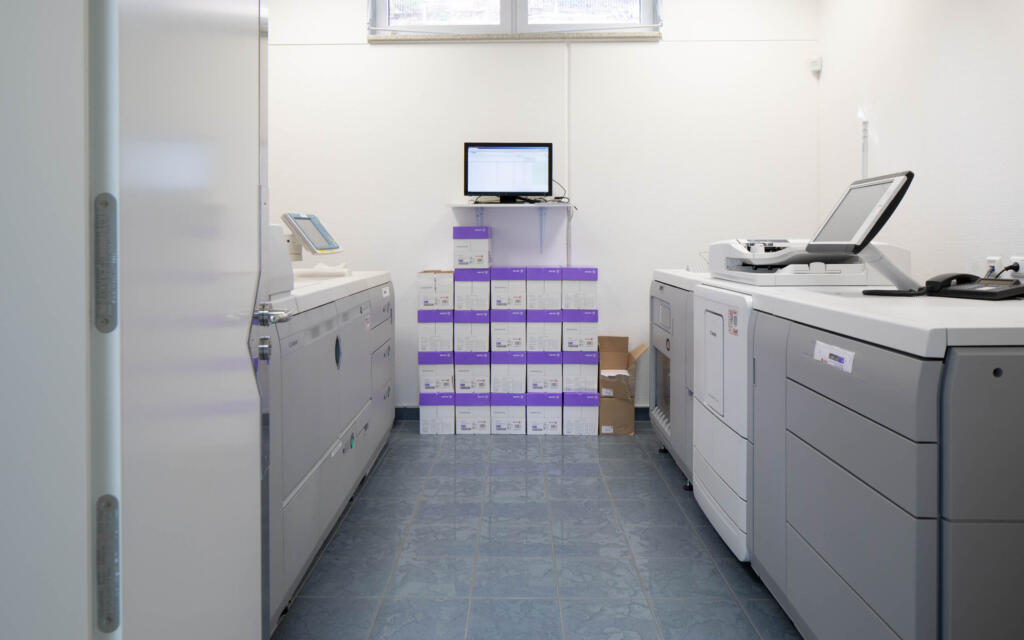
The talent factory
The shortage of skilled workers hits the companies beyond the pull of the large urban centres especially hard. The BID Group in the Upper Franconian town of Coburg is also confronted with this challenge. Here, we simply develop the urgently needed specialist expertise in-house instead of investing huge amounts of time and effort searching for it.
What it means to take responsibility for the training of one's future specialists can be observed at the BID Group in the morning in the seminar room. The first-year apprentices take their places at the workstations equipped with laptops on a daily basis during the intensive training programme, which lasts for at least three months.
When there is a shortage of skilled workers, it makes sense not only to look for them but also to train them yourself. The training quota of the BID Group is traditionally very high. Every year, at least 15 school leavers start their careers here. However, the company is not satisfied with this. 'We want more', says Marina Dienemann, who is in charge of the training programmes.
By 'more', the head of practical training means additional training within the traditional training, which upgrades the usual duo of vocational school and practical work to a triad: 'With this additional training, we try to provide the apprentices with a fundamental, shared understanding of all aspects of our work.'
In line with this aim, the intensive training programme introduces entry-level employees to topics from all departments of the company, for example. The trainees move to the respective departments, such as administrative processing, sales, accounting or IT, only after this introductory unit. Here as well, additional internal training programmes are held throughout the entire vocational training period to complement practical work and vocational school instruction. The concept is also used for new hires.

Complex requirements
This special commitment to the transfer of knowledge within the company is not solely due to a shortage of skilled workers. 'The work in the debt collection sector is very complex and there is no specific vocational training for it in the local CIC district,' explains Marina Dienemann. Officially, the BID Group primarily trains office management assistants. However, the curricula of the vocational schools do not adequately cover the broad, sophisticated subject matter of the company's work.
Marina Dienemann introduces the special training concept used by the BID Group right from the start in the interviews with applicants. 'This approach is frequently one of the reasons why the school leavers decide to join us,' says Dienemann, who herself has been working for more than twenty years for the enterprise. She is convinced that the internal training programme continues to be a hit with young people. 'Their expectations of an apprenticeship have risen. An apprentice no longer just wants to make coffee, but also to be supported as well as challenged during their training.'
At the same time, however, the company also benefits from the fact that 'our trainees in their third year are now much further advanced in their practical and theoretical knowledge than was often the case in the past,' says Dienemann. This enables young employees to perform complex and value-creating tasks early on.
'The work in the debt collection sector is very complex'
Employees encourage and support future colleagues
An important reason for the success of the programme is that the concept is put into practice and supported by all employees. Every trainee is mentored by a long-standing employee from day one. The internal training courses are also designed, further developed and carried out by the employees themselves. The trainees are explicitly involved. For example, it is a tradition that the vocational school students of the third year of apprenticeship have a say in the first-year training programme. 'We give our colleagues in charge of training a great deal of freedom in making decisions about the internal training programmes. Often the content is even individually adapted to the level of knowledge of the respective trainees,' explains Dienemann. 'For example, we set different priorities for very young trainees than for older ones.'
This approach enables the newcomers not only to immerse themselves in the professional subject matter and company-specific processes, but also gives them the opportunity to establish connections within the workforce at an early stage and quickly feel that they are firmly integrated in it. 'Ideally, after the training phase, which lasts at least three months, the trainees switch to teams of a maximum of twenty employees, in which they spend the entire training period. If we notice that it doesn't work out that well on a human level, we place them in new teams.'
The consistent implementation of the in-house development of skilled workers also includes offering each trainee an appropriate permanent position in the BID Group upon successful completion of the training. The annual hiring rate of one hundred percent reflects the success of the training concept. Dienemann adds, 'When it comes to hiring our trainees, we don't just look at current requirements. Rather, we consider what the company will need in a few years' time. Perhaps we don't necessarily need 15 new apprentices every year, but in the future we will definitely need the skilled workers they will become.'
'We consider what the company will need in a few years'
April 2019

